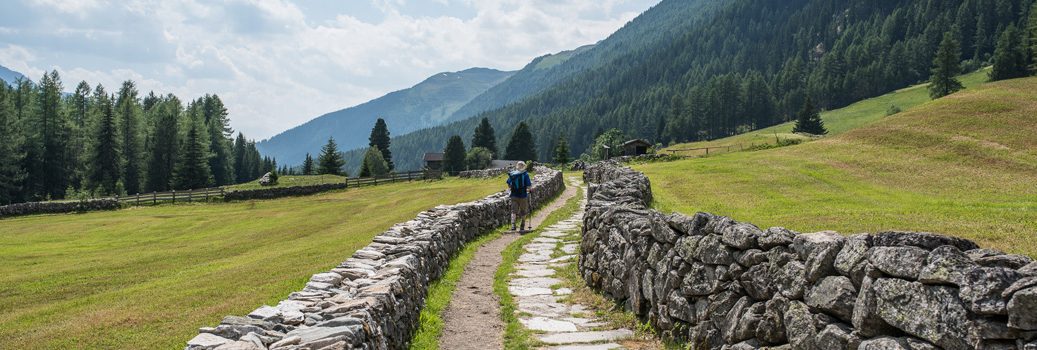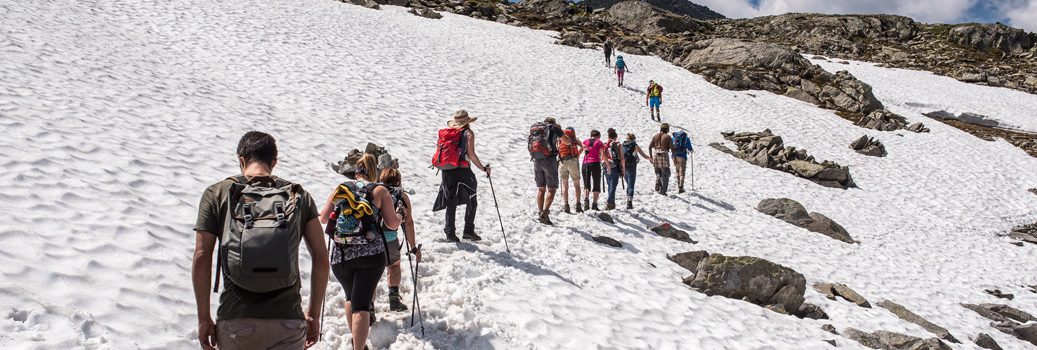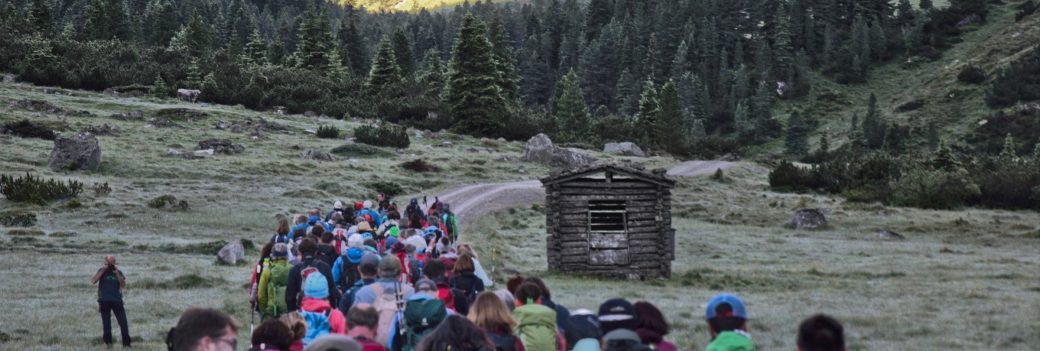In the summer of 1997, a man invited his four sons and his wife to travel from all over Canada, the US and UK to a hotel on the shores of beautiful Lake St. Wolfgang in Austria to embark on a mysterious road trip into his past. Until then Bernard Dov Protter had only ever fed them meagre snippets about his early life. Now he was promising to reveal secrets hidden for decades.
A recollection of Adam and Miles Protter.
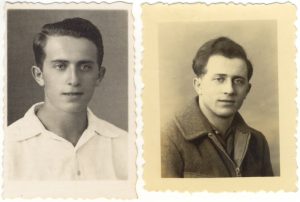
Passport photos of Bernard Dov Protter
Early life
What did we know for sure about our father? Bernard Dov Protter was born into a Jewish family of furniture manufacturers in Vienna in 1922. In the 1930s, his brothers moved to South Africa and his sisters to Palestine. His father, a WWI veteran, died just before the Anschluss in 1938. Later that year, with Nazis in pursuit, Dad used his Boy Scout skills to sneak through the mountains to seek refuge in Switzerland (a near impossible feat given their strict border control), and soon joined his sisters in Palestine. At the same time his mother sailed on a refugee ship from Vienna to Palestine, but the British turned them away and sent them to Mauritius, interning the survivors for the entire war. In her diary of the journey our grandmother wrote of immense suffering and disappointment. Once in Palestine, we knew only that Dad worked on a farm and a few years later joined the British Army. He said nothing of this period, the War nor the post-war years. His story only continued after emigrating to Canada in 1953.
Entrepreneur and family man
Arriving in Toronto, we knew he quickly found his feet establishing a successful construction business. He was introduced to a nice English girl but was soon smitten by her vivacious and stunning English flatmate, Patricia. Dad got a buddy to take out the friend freeing him up to ask out Patricia. They fell in love, married, had four boys and together created a remarkable life for themselves. Every year on Christmas Eve they gathered immigrant friends to our home for carols and steak and kidney pie. They were tireless fund raisers for the National Ballet of Canada and threw fabulous parties attended by dancers, artists and bohemians of all kinds, with appearances by the ballet dancers Nureyev, Karen Kain and Eric Bruhn.
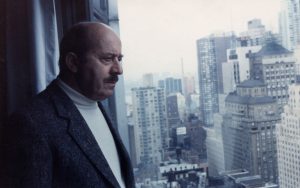
Protter in Toronto
Dad became an inventive and prolific Toronto developer. He flew us to remote lakes in his float plane for camping trips. He was an obsessively competitive tennis player (beating men half his age), and a voracious learner with an enduring commitment to alternative energy. He had a knack for the stock market and lived his life with panache, flair and passion. He spoke a number of languages but all efforts to anglicise his Austrian accent failed. He was always interested in our friends, who responded to his warmth. People loved him because of his kindness and encouragement.
Tragically our mum Patricia died of cancer in 1974. We were all devastated, and Dad lost his way for many years.
When we asked our dad about his past, he would not tell us anything
The mystery started to unravel
From time to time, we’d ask him questions about his past. He refused, once even slamming the table, shouting, “I’ll never tell you!”
In the 1990s, with his health failing and Parkinson’s disease taking hold, he met Betty, ‘the second love of his life’ and everything changed. He was convinced to return to Israel for the first time since the war and was received as a hero, but we didn’t know why. In 1996, he decided it was finally time to tell the details of his escape from the Nazis, but not to his family! Angered by global criticism of the Swiss for their ambivalent attitude toward fleeing Jews during the war, he called the Schaffhauser Nachrichten out of the blue, telling the surprised journalist a story of gruff but decent Swiss border guards who offered a young refugee asylum, food and lodging (the first few days in the jail with the door left open!) until he could travel to Palestine. The article ended with Dad’s words of gratitude: “With their so obvious kindness the Swiss lifted a massive weight off my chest. I just didn’t know how and to whom to write. It was almost like being held back by paralysis. Now I can say it, ‘To Switzerland and all of the Swiss: My sincerest thanks for the asylum you granted to me on August 2, 1938!’” The article amazed us. Here was our Dad revealing fears and vulnerabilities he felt as a teenager we’d never heard before.
The next year, accompanied by his wife and four sons, Dad returned to Austria to revisit his post-war past, up close. We drove to Saalfelden, about 70km south of Salzburg, to look for what used to be a displaced persons camp (DP camp) but were not sure why. After searching all over we came upon an Austrian military base where among the warehouses, garages, trucks and fortified buildings we spied a cluster of WWII era barracks, a little island of history surrounded by modernity.
“This is it,” he said quietly. He began to tell us what we were looking at and the background story. After arriving in Palestine in 1938, Dad lived in a farming community near his sisters but soon realized farm work was not his thing. Relief came when a mysterious man arrived one day to offer the opportunity to be trained for the local militia. He’d apparently been noticed by the Haganah, the Jewish underground paramilitary operating in British Palestine. Dad jumped at the chance.
The mysterious people eventually returned saying the British were looking for Jews and Arabs to fight together against the Germans. Thinking ahead to establishing a state of Israel, the Haganah encouraged promising young Jewish men to join so they could learn about soldiering from the British and set up their own army.
His role in the post war years
Dad said nothing about his time in the war and fast forwarded to the chaos of post war Europe. Instead of returning to Palestine after demobilization, Dad and a few other colleagues infiltrated a DP camp in Austria. It was administered by American occupying forces who didn’t know how to deal with the tragic collection of concentration camp survivors, former partisans, escapees from the oncoming Soviets and other persecuted folk with nowhere to go. Many were dying and there was friction between Jews of different nationalities and with other Europeans. The Americans were relieved when all of a sudden, leaders emerged to organize the rabble. Dad and his colleagues led exercise parades, organized orderly queuing and distribution of food and medicine and generally made things easier for the occupiers.
Little did they know Dad was not the person he claimed to be, having switched identity cards with a refugee making his way to Palestine. He and his friends were operatives working with the Haganah to channel refugees into Palestine against the British blockade, something a former British soldier could not have been caught doing.
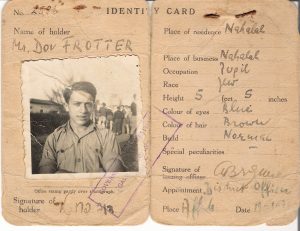
Fake documents and names that Protter used for his work for the Haganah/ Jewish Brigade
He and his friends channeled refugees into Palestine
They fine-tuned a system that began whilst still in British uniform clandestinely using British military trucks to move displaced persons south to Austria, a sort of ‘underground railroad’ that at one point stretched all the way to Belgium. Dad described how they would bring a large group of sick and exhausted refugees to hide in the woods outside a camp. Then they would send the rested, fed and recuperated people living in the camp out for ‘hikes’ and sneak in the new arrivals to recuperate. The rested ones were then led on an arduous trek over the mountains to the seaports of Italy and onto commandeered ships to run the blockade into Palestine.
Fortunate coincidence
That was all Dad told us. He died the following year leaving us to discover dozens of photos of him in the mountains of Austria and IDs with all kinds of false names. We found an old film where he’s equipped like a mountaineer with compass, maps and hiking boots accompanying large groups of people hiking over the mountains. What was he doing? Where did it take place?
We later found out from books and documentaries that Dad’s army unit was called the Jewish Brigade which had a well-documented role in the Bricha or escape of refugees to Palestine. But we were still left with all kinds of questions. More than twenty years later a chance encounter with Rami Litani, an enthusiastic amateur historian who lectures about the Jewish Brigade on Zoom, unlocked more mysteries. He watched Dad’s old film and instantly recognized the tavern where Dad was standing, and the mountain people were climbing. Rami shared about the Alpine Peace Crossing and the opportunity it gave him to honour his father, also a Brigade member, and those involved in the Bricha. We’d never heard about the APC before and now cannot wait to undertake it as a family. What a wonderful ritual to remember, experience the escape for ourselves and acknowledge the plight of refugees today.
Our father had his own reasons for keeping his story to himself. We’ve always been immensely proud of him, and are even more so now we know he helped so many to a new life. We’re grateful Alpine Peace Crossing provided the last piece in the puzzle of this part of Dad’s life.
Information on the authors: Adam Protter, son of Dov Bernard Protter, a chef, caterer and entrepreneur who lives North of Vancouver, Canada, with his family. Miles Protter is now on his third career as an executive mentor and writer and is actively involved in men’s work in his home town of Perth, Western Australia.




